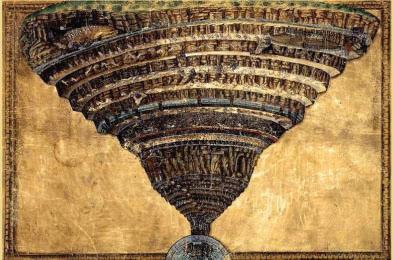
3 minute read
A Letter from Fr. Dominik
Inferno Canto III: Hell’s Geography

Virgil and Dante reach the gates of hell and read the words inscribed, “ABANDON EVERY HOPE, WHO ENTER HERE” (Inferno, Canto III). The inscription is a difficult and troubling verse. Canto III reveals to Dante and Virgil why Hell exists at all. The gates inscription gives us three answers. Hell exists because of God’s justice, wisdom, and love. A natural question which I hope arises in all of you is how can an all-loving God allow these souls to suffer this way? Even Dante, the pilgrim, turns to Virgil and says, “Master, their meaning is difficult for me” (Inferno, Canto III).
It is a harrowing message which shocks all who read Dante’s poem. What kind of journey is without hope? Does Dante realize what he is getting himself into? For the next thirty cantos, Dante will descend and meet all the souls whose fate has been judged. I think the whole Inferno is a reflection of Dante’s own personal struggle with the question of justice and its relationship to love. Love, by its nature, requires freedom and freedom gives us the capacity to accept or reject the love of others including God. In this bulletin, I will not be able to cover all the cantos, but I do wish to offer a basic outline of Dante’s vision of hell.
Dante’s Inferno contains nine circles. Each of the nine circles in hell represents a different sin, each with its own degree of wickedness and with a specific punishment. Dante notes that as the circles descend, they become progressively smaller, and more intense. The further down Dante goes into hell, the greater the sin is and its respective punishment. The punishment or what scholars call the “contrapasso,” is relevant to each sin. The contrapasso is an important literary device Dante uses to teach the readers about the nature of sin. Hell should not be seen as some new form of punishment, rather it is an unmasking of what your life on earth really was. If you lived your earthly life filled with hate, then hell is only a continuation of that. For example, those who lived a life of wrath are condemned to constant physical battles in the river Styx. The lustful in Canto V are swept in a storm, because in life they allowed the storm of their own passions to sweep them. Hell is the place where the punishment truly fits the crime.
As Dante travels through each circle, he encounters notable figures from history who were guilty of sin. Dante the poet will incorporate characters from Greek mythology such as Charon, who was the ferryman of Hades, to become his escort through the river Acheron. Dante reimagines Cerberus, the three-headed dog, as one who tortures the gluttonous. The mythical dog exemplifies ravenous gluttony and therefore fittingly tortures the souls who share his untamed appetite.
The First circle of hell is Limbo which contains the virtuous pagans of the ancient world who lived ethically and moral lives but were never baptized and cannot enter Paradise. The Second circle of hell holds those who gave into lust and are doomed to be eternally swept and tossed by storms and winds. In the Third circle of hell are those souls who were guilty of gluttony, or indulging in food or drink excessively. Those who were guilty of the sin of avarice, or greed, reside in the Fourth circle of hell. In life, these people hoarded money, spent excessive amounts of money, or were highly materialistic. Intense anger, or wrath, is punished in the Fifth circle of hell. There are two types of souls in the Fifth circle: those who became easily or violently angered, and those who were sullen, or moody and grumpy, in life. The Sixth circle of hell contains the souls of those who were guilty of heresy. Heresy is holding beliefs contrary to the Catholic faith. The violent are condemned in the Seventh circle of hell and the fraudulent are condemned in the Eighth circle of hell.
An interesting question that I posed to myself was why are the fraudulent in deeper hell than the violent? For Dante, lying is a worse sin than greed or even murder. It is because Dante holds that the mind has greater value than the flesh. Lying involves deception which is a deviation from truth. Think about it, in order to lie, one must know what






